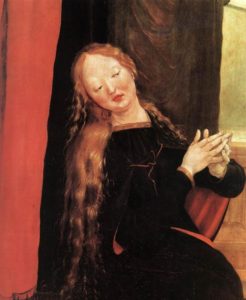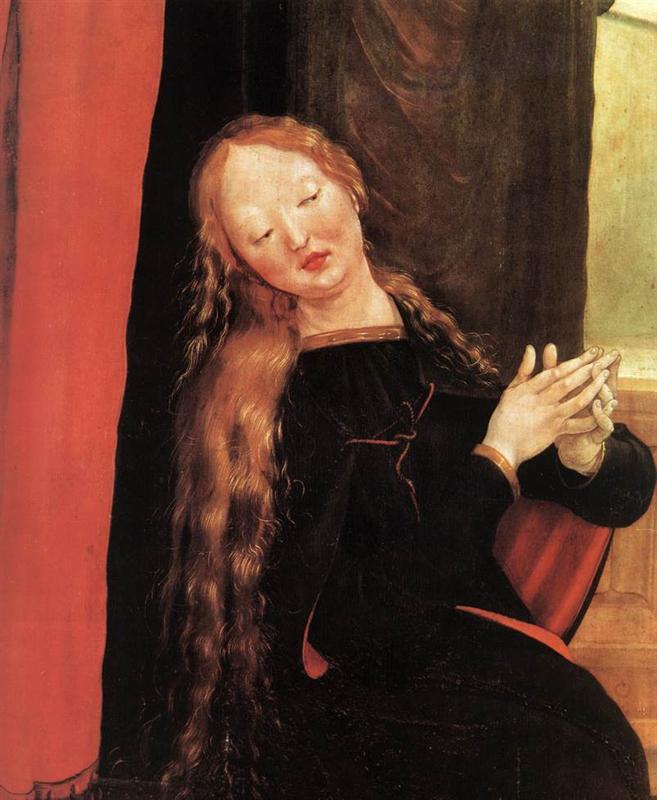
Central idea: God has blessed humanity through the Blessed Virgin Mary, Mother of God. Doctrine: The New Law frees from restrictions of the Old Law. Practical application: The blessings of the children of God.
Lectionary 18.
Central idea: God has blessed humanity through the Blessed Virgin Mary, Mother of God
Reading 1 Nm 6:22-27
The LORD said to Moses:
“Speak to Aaron and his sons and tell them:
This is how you shall bless the Israelites.
Say to them:
The LORD bless you and keep you!
The LORD let his face shine upon
you, and be gracious to you!
The LORD look upon you kindly and
give you peace!
So shall they invoke my name upon the Israelites,
and I will bless them.”
- God is good. The covenant he made with the Chosen People through the intercession of Moses is good. It is ultimately a blessing from God if accepted.
- The Lord has blessed Mary above all the Chosen People. In the person of her Son, the Lord literally and physically let his face shine on Mary, looking upon her kindly and giving her peace. Through Mary, because through her Son, everyone else now has the chance to receive these blessings.
- The Lord’s face now shines on Mary fully and eternally. For her is fulfilled the promise we share in: the Lord’s face will shine on each one of us fully forever if we make it to heaven.
- In this little reading, we can also see how God likes to work. God blessed the Chosen People. But he blessed them through Moses. Then he made provision for them to continue to receive that blessing through Aaron and his sons. Then, in the fullness of time, God blessed all of humanity through Christ. But that blessing came into the world through Mary. Then God made provision for them to continue to receive that blessing through his Church, both the hierarchical priesthood and ordinary Christians.
Responsorial Psalm Ps 67:2-3, 5, 6, 8
R. May God bless us in his mercy.
May God have pity on us and bless us;
may he let his face shine upon us.
So may your way be known upon earth;
among all nations, your salvation.May the nations be glad and exult
because you rule the peoples in equity;
the nations on the earth you guide.May the peoples praise you, O God;
may all the peoples praise you!
May God bless us,
and may all the ends of the earth fear him!
- The universal blessing of Jesus Christ, God’s response to our need for salvation, has been bestowed upon humanity through Mary.
- Christ’s new law of love is ready and waiting to be known and lived “among all nations.”
Reading 2 Gal 4:4-7
Brothers and sisters:
When the fullness of time had come, God sent his Son,
born of a woman, born under the law,
to ransom those under the law,
so that we might receive adoption as sons.
As proof that you are sons,
God sent the Spirit of his Son into our hearts,
crying out, “Abba, Father!”
So you are no longer a slave but a son,
and if a son then also an heir, through God.
- God has blessed us inestimably by sending his Son into the world through Our Lady not just to save us from our sins but to make us share in his divine life.
- The moral law of which St. Paul writes is entirely good. It is good in itself because it corresponds to the fulfillment of human nature. It is also good because it teaches us what is good and what is evil.
- This good moral law demands of us that we do what is right and it condemns us when we do what is wrong. But we become like slaves to it: while we want to do what is good, we also do what is evil, and we do what is evil also because we want to. This is an oppression.
- But through Mary’s Son, through whom God sends “the Spirit of his Son into our hearts,” we are made sons and heirs of God. This is freedom and blessing.
Gospel Lk 2:16-21
The shepherds went in haste to Bethlehem and found Mary and Joseph,
and the infant lying in the manger.
When they saw this,
they made known the message
that had been told them about this child.
All who heard it were amazed
by what had been told them by the shepherds.
And Mary kept all these things,
reflecting on them in her heart.
Then the shepherds returned,
glorifying and praising God
for all they had heard and seen,
just as it had been told to them.When eight days were completed for his circumcision,
he was named Jesus, the name given him by the angel
before he was conceived in the womb.
- There is a contrast in this reading between the shepherds and Our Lady.
- On the one hand there is the activity and talk of the shepherds. The shepherds came in haste and then departed, telling everyone they encountered what they saw and heard. That is all good.
- Mary, on the other hand is silent and immobile but not at all inactive. “Mary kept all these things, reflecting on them in her heart.” This is very good, too, maybe even better.
- Our lives tend to be all about activities and talk, although we often—usually—fail to speak about and act for Christ. Maybe this is because our roots of faith don’t go deep enough, because, unlike Our Lady, we don’t silently ponder God, the events of our lives, and what God has done for us.
- One thing we can ponder is the freedom Christ gives us by making us sons of God living under a law of freedom.
Doctrine: The New Law frees from restrictions of the Old Law
- Our Lady is the Mother of God. Jesus is Son of God and Son of Mary.
- Jesus perfectly fulfilled the Law of the Old Covenant (CCC 580).
- Because he was the Son of God, he was the divine legislator who made this law. Because he was the Son of Mary, he was a man “born subject to the law.” This one divine person was able to embody and live this law. (CCC 580)
- This law was no longer “engraved on tables of stone” like Moses’ Ten Commandments. It was written “upon the heart” (Jer 31:33) of the Servant of God and of humanity (Is 42:1). This servant became “a covenant to the people” (Is 42:6) because he would “faithfully bring forth justice” (Is 42:3). (CCC 580)
- Jesus not only fulfilled the Law by doing what it asked. He also took upon himself “the curse of the Law” inflicted on those who, having agreed to it, do not live by it. (CCC 580)
- Having fulfilled the Old Law, he could promulgate a New Law called a law of love, grace, and freedom (CCC 1972).
- “The New Law is called a law of love because it makes us act out of the love infused by the Holy Spirit, rather than from fear” (CCC 1972). It is not a bad thing to do the right thing out of fear of punishment or out of fear of displeasing God our Father. But it is perfect to do the right thing because we love that right thing and because we love what God wants. The Holy Spirit gives us this love.
- The New Law is called “a law of grace, because it confers the strength of grace to act, by means of faith and the sacraments” (CCC 1972). It is a very good thing to love what is right but we also need the help of grace to do the right thing. The ordinary way we receive God’s grace is through the Sacraments. The most fundamental grace we receive in Baptism is the infused virtue of faith, which enables us to assent to what God has revealed in Christ and to place our entire trust in Him.
- The New Law is called “a law of freedom, because it sets us free from the ritual and juridical observances of the Old Law, inclines us to act spontaneously by the prompting of charity and, finally, lets us pass from the condition of a servant who ‘does not know what his master is doing’ to that of a friend of Christ . . . or even to the status of son and heir” (CCC 1972).
- Instead of the hundreds of precepts of the Old Law, we only really have one law, the one Christ gave the apostles at the Last Supper: “Love one another as I have loved you” (Jn 13:34).
- We are free to apply this love, which wills the true good of the other, in all the ordinary circumstances of our lives as they arrive.
- We can get to the point that we act out of this love because of the high status we have been given. We are children of God and want to and can act the way the children of nobility ought to act.
Practical application: The blessings of the children of God
- Christmas is a season to be mindful of our blessings. The truth is that each one of us has a lot to be thankful for. Let’s thankfully count our blessing every day.
- Isn’t our greatest blessing that we are now a son or a daughter of God? Our brother is Jesus. Our mother is Mary, the exemplar of a daughter of God.
- We can begin again today living accordingly, in the way St. Paul points out to us:
When the fullness of time had come, God sent his Son,
born of a woman, born under the law,
to ransom those under the law,
so that we might receive adoption as sons.
As proof that you are sons,
God sent the Spirit of his Son into our hearts,
crying out, “Abba, Father!”
So you are no longer a slave but a son,
and if a son then also an heir, through God.
- With help of the grace of the Holy Spirit, we adopted children call God the Father, Abba, and freely love those around us the way Christ, the Son of the Father by nature, has loved us, even to the point of sacrifice.
Additional Catechism points and themes the Homiletic Directory proposes for the Solemnity of Mary, the Mother of God are:
CCC 464-469: Jesus Christ, true God and true Man
CCC 495, 2677: Mary is the Mother of God
CCC 1, 52, 270, 294, 422, 654, 1709, 2009: our adoption as sons
CCC 527, 577-582: Jesus submits to the Law, and perfects it
CCC 580, 1972: the New Law frees from restrictions of the Old Law
CCC 683, 689, 1695, 2766, 2777-2778: in the Holy Spirit we can call God “Abba”
CCC 430-435, 2666-2668, 2812: the name of Jesus

Leave a Reply